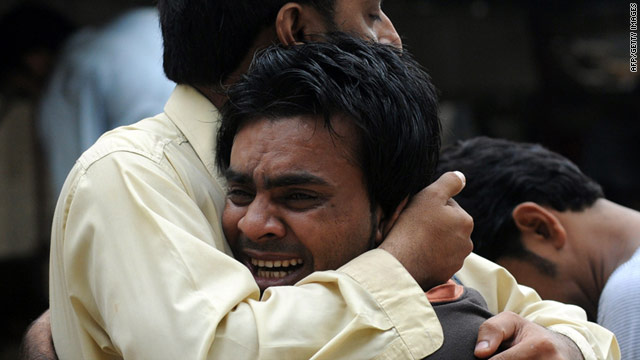At least 33 killed in 24 hours of violence in Pakistani city

- Several gunmen open fire on a former federal lawmaker
- Police suspect the gunmen targeted the member of the ruling Pakistan Peoples Party
- Karachi tackles years of ethnic and political violence
Islamabad, Pakistan (CNN) -- A former federal lawmaker is among at least 33 people killed in a fresh spate of violence over the past 24 hours in the Pakistani city of Karachi, police officials said Thursday.
Several gunmen opened fire on Wajid Karimdad on Wednesday night shortly after he entered a restaurant for Iftar, the traditional post-fasting meal during the Muslim holy month of Ramadan, said Karachi police official Naeem Shah.
Police suspect the gunmen targeted Karimdad, a member of the ruling Pakistan Peoples Party.
Most of the deaths on Wednesday night and Thursday morning were the result of drive-by shootings in Lyari and Baldia, two districts in Karachi that have been hit hard by years of ethnic and political violence.
Some of the victims were shot to death after they were kidnapped, Shah told CNN.
Officials say the killings appear to be linked to ongoing rivalries between three political parties vying for power in Pakistan largest city: the Muttahida Qaumi Movement (MQM), the Awami National Party (ANP), and the Pakistan Peoples Party (PPP).
The PPP, led by President Asif Ali Zardari, views Karachi as a crucial political battleground, but politics in Pakistan's economic hub are dominated by the MQM, which represents "muhajirs," descendants of immigrants from India decades ago.
The ANP is a secular Pashtun party based in militant-plagued northwest Pakistan, whose supporters have migrated south to Karachi because of the violence in their home region.
ANP supporters have the same ethnicity as the Taliban, so the MQM often accuses them of supporting militants. The ANP, in turn, accuses the MQM of organized crime and terrorist activity.
Supporters of the PPP are accused of having links to criminal gangs as well.
Analysts say lack of law enforcement has allowed supporters of the political parties to adopt a gang-like mentality.
Police officials claim low pay, a lack of manpower and resources puts the police force at a disadvantage against the criminal gangs fueling the violence.
According to the Human Rights Commission of Pakistan, violence between supporters of the political parties and other turf wars in Karachi have killed more than 1,000 people this year alone.
Journalist Nasir Habib contributed to this report.
